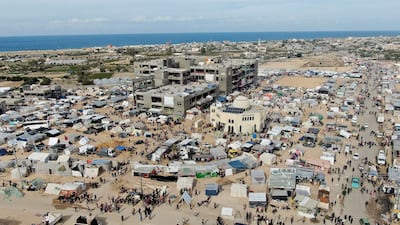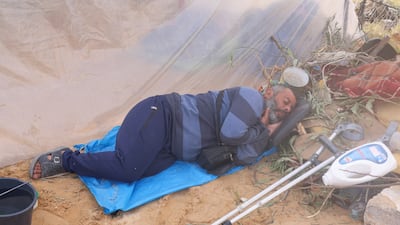Live updates: Follow the latest news on Israel-Gaza
Israeli tanks have reached Khan Younis in the heart of Gaza's south as attacks also intensified in the north.
The Israeli army burnt down a school in Beit Lahia, after forcing internally displaced people taking shelter there to leave, exposing them to danger as they sought refuge elsewhere, a witness told The National.
In Jabalia, which has been under near constant bombardment by the Israelis, 39 people from the Abu Warada family were killed after their home was targeted, medical sources said.
Shortages of food and water continue in the besieged enclave.
"There is no food or water. To find one kilo of flour is like a miracle," resident Ikram Al Madhoun, who suffers from kidney failure and is in need of medical treatment, told The National. Her situation is being exacerbated by a lack of clean drinking water.
Prices have also gone up five-fold, she said.
Ms Al Madhoun wants to go back to the rubble of her home in Gaza city so she can put up a tent at the site, she said.
The effect of the Israel-Gaza war on the enclave's healthcare sector has been "catastrophic", the World Health Organisation chief Dr Tedros Adhanom Ghebreyesus said at an emergency board meeting on Sunday, saying conditions were ideal for the spread of deadly diseases.
However, he said it would be all but impossible for the WHO to improve the situation.
"It's stating the obvious to say that the impact of the conflict on health is catastrophic," Dr Tedros Adhanom told the 34-member board.
"In summary, health needs have increased dramatically and the capacity of the health system has been reduced to one third of what it was."
A motion being reviewed by the board proposed by Afghanistan, Morocco, Qatar and Yemen demands passage for medical personnel and their supplies and tasks the WHO with securing funding to rebuild hospitals.
Yet Dr Tedros said it would be "almost impossible" to meet those requests given the security situation on the ground.
Residents have been posting appeals on social media through the sporadic internet connectivity they get to source medicine for their loved ones.
Islam Abu Roka has pancreatic cancer. He fled to Khan Younis from Gaza city. Shortly before the war broke out, he underwent surgery but is now unable to find the medicine he needs for his recovery.
“I left Gaza and came to Khan Younis 43 days ago. I can't find any insulin. Nothing is available now," he told The National.
Gaza's Ministry of Health says 48,000 wounded people in Gaza remain without health care, as 130 health institutions, 20 hospitals and 46 medical centres have gone out of service while supplies near depletion.
“I spend my days looking for anything to help me," Mr Abu Roka added. "Even painkillers. But I can't find them in pharmacies. I hope this nightmare ends so we can go back to our homes."
Hospitals in Gaza remain difficult to reach with communications down in the Gaza Strip.
About 80 per cent of Gazans have been displaced, the UN says.

UN refugee agency chief Philippe Lazzarini has accused Israel of forcing Palestinians out of Gaza, a claim Israel has denied.
"The United Nations and several member states, including the US, have firmly rejected forcibly displacing Gazans out of the Gaza Strip," Mr Lazzarini said in an opinion piece published on Saturday in the Los Angeles Times.
"But the developments we are witnessing point to attempts to move Palestinians into Egypt, regardless of whether they stay there or are resettled elsewhere."
This comes after a wave of mass arrests in northern Gaza, which Israel made public and residents of Gaza said included a number of children.
On another front, Lebanon's militant group Hezbollah said it had launched explosive drones at an Israeli command position on Sunday, while Israeli air strikes have hit southern Lebanon again.
The Israeli army said "suspicious aerial targets" had crossed from Lebanon and two were intercepted. Two Israeli soldiers were wounded and a number of others slightly injured from shrapnel and smoke inhalation, it said.
Israeli fighter jets carried out "an extensive series of strikes on Hezbollah terror targets in Lebanese territory".
There were no immediate reports of casualties in Lebanon.
The exchange of fire between Israel and Hezbollah, a heavily armed group backed by Iran, has marked the worst hostilities in the border area since the war in 2006.


